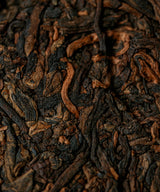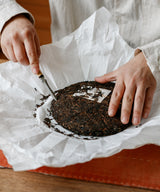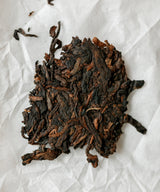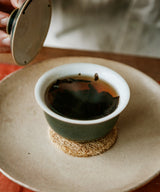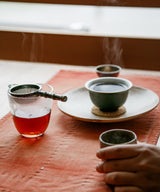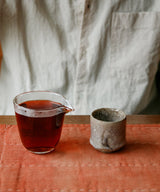Seeds of Virtue 2017
熟耰熟普
Harvest
Spring 2017
Origin
Jinggug, Yunnan
Mr. Tang left his corporate job in the city, Kunming, in 2006. He had rented a small place in rural Yunnan where his only intentions were to read, reflect, and drink tea with friends. In one of these conversations an old friend, Li, suggested that Tang grow tea in Li’s hometown, Yangta Village. That July the two of them traveled to Jinggu in Yangta and leased 11 acres of forested area from Li’s niece.
The area they leased was wild growth, at about 6500 ft elevation. This is where they would eventually plant 70,000 Jinggu Big White tea trees. Tang also leased another tea garden in the mountain that locals had shown him; a highly regarded area that was home to ancient pu’erh trees. And so, while he waited for his Jinggu Big Whites, Tang began making pu’erh from these very old trees.
We visited Tang’s tea estate in April 2019 and Tang took us on the steep hike to see his pu-erh tea garden. I spent several hours there, observing the graceful and efficient way that the elders harvested the tea leaves, studying the trunk structures of the ancient trees, and admiring the vibrant mosses that had grown on them.
For Mr. Tang, crafting beautiful teas from a clean and balanced ecosystem is sacred. He is deeply dedicated to the craft of traditional tea making; this philosophy guides everything he does, and is embedded in every single tea he makes. Alongside being an expression of this special ecosystem, his teas are so distinctly peaceful, and feel extremely clear, just as he feels as a person.
We have been asking Mr. Tang for a pu’erh ripe for many years, but making this fermented tea requires a production facility where the humidity and temperature can be controlled. Mr. Tang did not have access to a facility like this until very recently. In 2017, his good friend Qing Shui invited him to select some of his clean and high quality pu’erh raw to ferment into Pu’erh Ripe at the Jinggu Tea Factory. Mr. Tang used the leaves of 100 year old tea trees from Jinggu and blended them with tea leaves from Bulang Mountain. His thought was to combine the roundness and sweetness of old tea trees from Jinggu with the depth and intensity of tea from Bulang Mountain.
The tea leaves were harvested in the Spring of 2017 and fermentation started later that year, lasting for 6 months. The tea was then air-dried and aged until 2020 before being pressed into cakes. Mr. Tang named his first pu’erh ripe “Shu Zi,” a phrase taken from the philosophical works of the ancient Chinese philosopher, Chuang Tzu (Zhuang Zi). The name translates directly as “with deep plowing and careful and repeated weeding of the seed, my harvests were rich and abundant.” A sentiment that resonated with Mr. Tang’s approach to farming and crafting tea over the last decade: meticulously, fastidiously, and honestly.
This is one of our favourite pu’erh ripes. It has the rare quality of maintaining a light, almost refreshing mouthfeel, while still being earthy and soothing. It’s a tea that I would drink everyday in the winter, when I want something grounding and close to the earth, but not too heavy in texture.
. . .
Brewing guide
| Tea | 4 g |
| Temperature |
100°C |
| Water | 120 ml |
| Steep time | 10 - 60 sec |
| No. of infusions | 10 |

